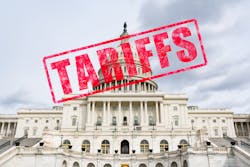US Quartz Manufacturers Want Tariffs Enforced
OPINION
As inflation continues to rise due to supply chain shortages, there is now widespread consensus on the need to rebuild domestic U.S. manufacturing. But even as the Biden administration looks to boost domestic production of electric vehicles and other emerging technologies, U.S. manufacturers are struggling against heavily subsidized imports.
My industry—which produces quartz slabs for countertops, tiles, and other home products—has seen this firsthand. Overseas quartz producers continue to sell large volumes of product in the U.S. at far below the cost of production. If Congress and the president are serious about rebuilding domestic American industry, it’s time to tackle such predatory practices and enforce U.S. trade laws.
Quartz production is an important industry in the United States. But as a recent U.S. Department of Commerce investigation has made clear, quartz producers in India are pulling out all the stops to undercut U.S. quartz makers. And after repeatedly stonewalling a federal investigation, these companies are now trying to evade U.S. trade laws.
In 2018, American quartz manufacturers and their employees gained an important victory against unfair trade when the U.S. Department of Commerce and the U.S. International Trade Commission (ITC) determined that Chinese quartz countertop manufacturers violated longstanding trade laws. An investigation found that Chinese companies—aided and abetted by hefty subsidies from Beijing—were selling large volumes of quartz product in the U.S. market at well below the cost of production. The Commerce Department subsequently imposed tariffs to address this “dumping,” an important step to help America’s quartz industry start reclaiming domestic market share.
Since that time, investments in U.S. quartz production have poured in. Alongside American producers, companies from South America, Israel, Korea and Spain have started investing in new U.S. quartz factories and American jobs. The only problem is that illegal, predatory dumping of Indian quartz products is now putting this investment and job creation at risk.
What’s particularly disturbing is that much of this dumping is coming from the same producers originally targeted by the Commerce Department. In order to evade U.S. tariffs, overseas quartz producers simply moved their factories and equipment from China to India. And so, just as U.S. quartz producers were getting back on their feet, they’ve had to once again petition Washington to take action.
Earlier this year, the Commerce Department investigated an Indian quartz manufacturer suspected of selling product at below fair-market value. After the company’s data was questioned, Commerce granted the company multiple extensions to submit additional data. But after further delays, Commerce properly imposed preliminary tariffs on the Indian company for violating U.S. trade laws.
That should be great news for U.S. quartz companies. But now, importers of this predatorily dumped quartz product have gotten involved—and want U.S. trade regulators to halt the tariffs.
Particularly galling is the fact that quartz importers are citing “free trade” as a reason to avoid the lawful use of U.S. trade remedies. They simply dismiss anyone supporting the tariffs as being “protectionist.”
There’s a tremendous irony here, since Indian companies are using blatantly protectionist, market-distorting tactics to undercut U.S. companies. But when domestic companies protest, importers and their lobbyists—along with “free trade” ideologues—falsely brand them as engaging in protectionism. This simply ignores the impact that unfair trade is having on working Americans.
The effort to block the U.S. from enforcing trade laws is causing market uncertainty. Companies are reconsidering or holding back on planned investments in America’s domestic quartz industry. That has led to lower production, reduced operating schedules and declining performance throughout the U.S. quartz supply chain.
This campaign against the proper enforcement of U.S. trade laws threatens the rule of law and American jobs. Washington must insist on fair trade—and continue to defend America’s quartz makers and other manufacturers by strongly enforcing existing U.S. trade laws. Defending our workers and enforcing our laws is essential to our nation’s future economic and national security.
Marty Davis is President and CEO of Cambria, a producer of quartz surfaces in the United States.
